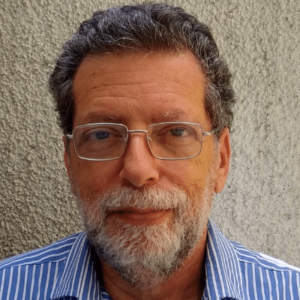David Mibashan is the new psychologist at Meetual. He speaks English, Spanish and French among other languages. As he wrote in his profile on the platform, working with people who feel uneasy or stuck and do not know to resolve something (either a particular issue or a long-standing situation) has been the core of his work for the past 35 years. David perceives himself as a partner with his/her clients in getting to the center of the issues.
A good therapy
More than thirty years ago I moved to Ottawa. I was finding my ways in a new University and ending a long-time romantic relationship. I knew I needed therapy. I had finished a B.A. and a Master in Psychology and I had been to several therapies throughout my life but none had really helped me.
I asked around and got the name of a therapist in Hull. My first appointment was on a cold Winter Friday at 9 PM. He asked me only one question, “What ails?” and after I spoke for a while, his comprehension of my situation moved me and surprised me.
Changes
A few sessions later, in Bill’s waiting room, while observing the shadows that the faint early Spring sun was casting on the furniture, I knew that there were three things I had to work on:
- where did I want to live;
- with whom;
- what kind of job did I want.
Two years later, seeing Bill every few weeks and close to ending therapy, I knew where I stood and I had taken many strides towards attaining my goals. More importantly, the road to obtaining those goals was nice and comforting.
A few years ago, long after I had finished therapy, working on a job I like, married to the person I felt comfortable with (the marriage took place one year after ending therapy) and living in the city where I grew up, I realized that Bill had an important influence in my life.
Studies and work
I finished a Doctorate in Clinical Psychology at the University of Ottawa in the early 90’s. After years of internships in Hospitals, Mental Health Clinics and Counselling Services, I chose to work with Client-Centered Brief psychotherapy. I believe that most of the problematic issues that regular people encounter have to do with attempting to lie to ourselves (the only person in the world that definitely we cannot lie to is oneself), convincing ourselves that we like what we don’t or that the problems will go away.
Humans try to protect themselves and often do not realize that they stumble many times with the same rock (for example, choosing partners that do not make us feel good; promising ourselves that we will lose weight or stop smoking, only to frustrate ourselves once again). We are not entirely to blame for acting in ways that are damaging to ourselves. Society is very competitive and looking good and denying problems is a message we hear all the time. Furthermore, many people lack the skills and the willpower to attempt change.
Change is scary. It implies making decisions, risking, but above all, the fear of freedom might be paralyzing. Becoming free is scary because we are then responsible for the roads we take. There resides a large contradiction: we want to be free and able to decide the path we take. However, many people back off and do not choose freedom. Why? Probably because they are insecure, they do not trust their
inner strength.
Method
Over the last fourty years I have seen clients (I started in University in January 1981). My objective is to understand what hurts the client and what does s/he define as change, as moving forward. Singularly enough, many clients want to attain things (careers, hobbies) that they liked since adolescence or even before.
Being honest with oneself, daring to feel what hurts, to let it go through us, getting to know what we want and accepting where we are now, even if we are stuck, those are the building blocks to growth. What tools do we have at our disposal to help a client grow? First of all, Intensive Listening. To listen, truly, to someone is one of the most difficult tasks one can think of. In day-to-day life when someone is talking, the listeners categorize what the speaker is saying or think about their own reply or bring to mind a “superior anecdote” to tell once the speaker has finished, or sometimes even before s/he did.
Listening helps a honed therapist to understand, in a profound way, what the client experiences. It is important to reflect the emotions one picked up to the clients in order to let them know that one has understood what they feel. From there on, if the therapist has a good rapport with the client and is not afraid to touch the delicate issues, therapy moves forward. Early in my studies, a great Professor I had, Josef Schubert (University of Regina), made us listen to two recordings of sessions. A good one and a bad one. He explained to us why. In the bad one, the therapist had changed the topic when it was deep or scary.
The success of therapy is measured by the client, usually by the changes that take place. Those changes might take weeks, months or years, like for instance starting a new career and finishing it. I am a true believer that projects are the spinal cord of happiness. Studying something, developing a business, creating, forming a family, having a hobby are all projects. Even losing weight or learning a sport are also projects. Most projects have ongoing milestones that let us know that we are on the move. I have kept in touch for many years after finishing therapy with some clients. It is very heartwarming to see clientsl love forward in life ten or fifteen years after therapy.
I can think of many clients who changed studies, or careers, ended complicated relationships, straightened out family relationships that had been neglected for a long time, recovered from addictions and many other things that they set up to do. Most of them will not appear in the cover of well-known magazines. But they are satisfied, and that is the best that a person can have.
Important points
● Therapy is what happens between sessions. The moments of attenuated consciousness, like when we just wake up or when we do a repetitive task, is when we usually have insights and realize important things about ourselves
● Once we know something, it is impossible to unknow it. So, if we realize that we are afraid of something it is better to confront the feeling and let it go through us than to try to push it away, because that will never succeed and the cost is high
● We get frustrated only according to our expectations. Long lines now, in COVID times, do not frustrate me as I know that there is no alternative
● Happiness is not the same as pleasure. Happiness is a state of well-being. It is not permanent but we know it is accessible. Pleasure is a rush of emotions. Nothing bad about that, but it cannot replace happiness
● When one does something and doesn’t think that s/he could be doing something else, then that thing was truly enjoyable and provided us with happiness
● Having a “comfort zone” is not always a bad thing
● Not to make a decision IS making a decision
● When questioning a decision made in the past, it is useful to remember the circumstances that surrounded that decision
● Most people have a secret that they have not told to their best friend, to their therapist or even to themselves. Knowing what the secret is can be unblocking
● We cannot change the past. But we can change the present and therefore the future as well
COVID The pandemic has shaken up the world in a significant way. There are no universal formulas on how to mentally cope with it. People are affected in different ways. The pandemic can bring up issues related to the illness itself but it might also intensify feelings that we had from before. As with any extreme situation we might face in life, we have to toughen ourselves to be able to carry forward with day-to-day tasks but at the same time check within ourselves whether we need external help to cope.
Summary
Throughout my years as student, client, therapist and supervisor I have met many good therapists. I always found it hard to define it but there is something common to all of them, even across languages, cultures and countries. It probably has to do with their own experience of pain and growth, with their caring for others, with their general attention to people and motivations and with their belief that change is possible. Theoretical backgrounds and methods are secondary to their attitude and to the conviction that there can be better times ahead.








